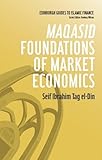Maqasid Foundations of Market Economics / Seif Ibrahim Tag el-Din.
Material type: TextSeries: Edinburgh Guides to Islamic Finance : EGIFPublisher: Edinburgh : Edinburgh University Press, [2022]Copyright date: ©2013Description: 1 online resource (248 p.)Content type:
TextSeries: Edinburgh Guides to Islamic Finance : EGIFPublisher: Edinburgh : Edinburgh University Press, [2022]Copyright date: ©2013Description: 1 online resource (248 p.)Content type: - 9780748670024
- 9780748670048
- 330.0917671 23
- HB126.4
- online - DeGruyter
- Issued also in print.
| Item type | Current library | Call number | URL | Status | Notes | Barcode | |
|---|---|---|---|---|---|---|---|
 eBook
eBook
|
Biblioteca "Angelicum" Pont. Univ. S.Tommaso d'Aquino Nuvola online | online - DeGruyter (Browse shelf(Opens below)) | Online access | Not for loan (Accesso limitato) | Accesso per gli utenti autorizzati / Access for authorized users | (dgr)9780748670048 |
Frontmatter -- CONTENTS -- Acknowledgements -- List of figures -- Introduction -- Part I. Methodology of economics from the maqasid perspective -- 1. Economics of maqasid -- 2. Economic exchange and utility theory -- 3. Non-market economics and maqasid equitable public policy -- Part II. Legitimate economic exchange and productive organisation -- 4. Trade versus usury -- 5. Principles of economic exchange and the nature of money -- 6. Economic organisation and factor productivity -- Part III. Market imperfections -- 7. Sources and treatment of market imperfection -- 8. Lessons from sales usury on market imperfection -- Glossary -- Bibliography -- Index
restricted access online access with authorization star
http://purl.org/coar/access_right/c_16ec
Explains the exchange economics behind the Shari'ah compliance conditions of Islamic financeDrawing on received sources of 'maqasid' (Shari'ah's practical objectives), this book demonstrates how the principles of market economics affect how markets and financial instititions actually operate under Shari'ah law. It shows where Islamic economics converges with and differs from conventional economics through the banning of usury and other Shari'ah-prohibited trade practices.Islamic finance rests on the principles of free market exchange of Islamic economics. But the latter has failed to keep pace with the rapid developments of the former. Much work published about Islamic economics is at least idealistic if not radically ideological, with little relevance to the Islamic financial industry. This book provides the coherent body of economic theory that students and practitioners of Islamic finance need in order to understand how the maqasid gives a sense of direction to developments in the industry. Key FeaturesDeparts from the common conceptual grounds of market behaviour shared by the maqasid approach and the conventional approach to economicsClearly explains the maqasid economic rationale of precluding interest rates on money capital from legitimate economic exchangeStudents can track their progress with learning outcomes, chapter previews, chapter summaries and revision questions
Issued also in print.
Mode of access: Internet via World Wide Web.
In English.
Description based on online resource; title from PDF title page (publisher's Web site, viewed 02. Mrz 2022)


